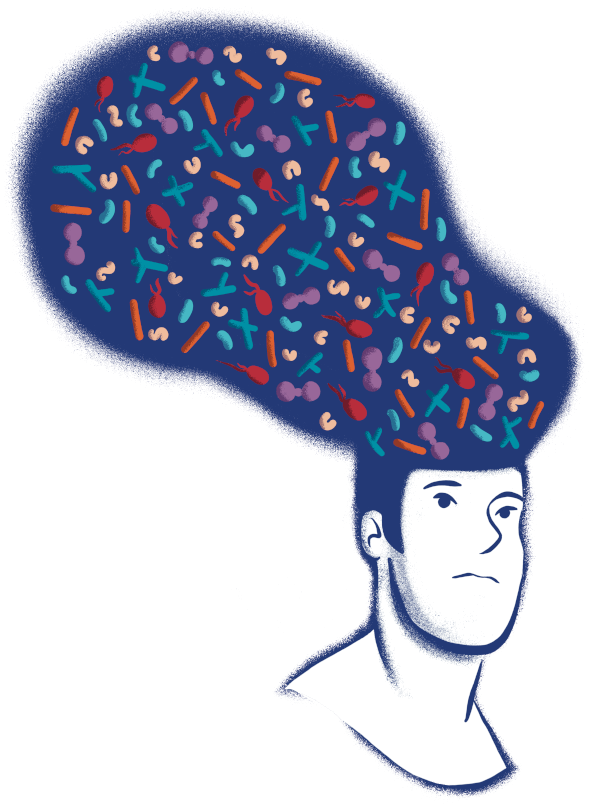When the intestines make you forgetful
The discovery that people with Alzheimer's disease have an altered microbiome could influence the treatment of neurodegenerative diseases.
At first, many of his colleagues merely shook their heads when Christoph Laske presented them with a new consideration: What if, the renowned dementia researcher asked, the gut had a direct influence on the development of Alzheimer's? "Ten years ago, almost no one was aware of the significant role the gut microbiome plays in the health of the entire body," says Laske. He focused his research precisely on this approach, because he is convinced that if you improve the health of the gut, you can use it to fight Alzheimer's specifically.
Christoph Laske has been active in dementia research for decades: In Tübingen, he works at the DZNE, and at the same time he heads the section for dementia research and the specialized memory clinic at the university. For Alzheimer's experts like him, a particular protein has been the focus of research for years: amyloid beta. In the brains of patients, it literally clumps together: these characteristic deposits are called plaques and, apart from anti-amyloid antibodies, science has not yet found a means to dissolve them or even prevent them in time.
Microbiome in the intestine is composed differently

"A few years ago, I came across a study that immediately electrified me," recalls Christoph Laske. In it, these amyloid plaques were studied in the brains of mice whose genomes had been altered to develop Alzheimer's pathology in the brain. The researchers had found that when the animals grew up in sterile conditions and therefore had no microbiome in their gut, they developed fewer of the amyloid deposits in the brain. "I wondered if this was just as true in humans, and it was clear to me: we need to do a study on this," Laske says. With his team, he immediately set to work: he named the project "AlzBiom Study," which started in 2017. All participants have been regularly examined since then: Their memory performance is checked, and they also provide stool samples. "The study is still ongoing, but the first data are already available," says Laske - and it looks like he was right with his original suspicions: the Alzheimer's patients have a different composition of the microbiome in their intestines than the healthy test subjects.
This has brought the gut into the focus of brain research. The brain and the gut also have many things in common: For example, the gut is home to the so-called enteric nervous system, which contains more than four times as many nerve cells as the spinal cord. "It's also called the second brain," says Laske, explaining that the connection isn't just from that nickname: The vagus nerve connects the head and the gut, a veritable highway for exchanging information; and there are various messengers that keep in touch.
JUST TEN YEARS AGO, ALMOST NO ONE WAS AWARE OF THE SIGNIFICANT ROLE THE GUT MICROBIOME PLAYS IN THE HEALTH OF THE ENTIRE BODY.
Inflammatory-immunological processes in the background
Christoph Laske has also developed from his brain research into an expert on the intestine. There are millions and millions of microorganisms to be studied in the gut microbiome alone, as well as numerous cells and metabolic processes. But what does all this have to do with dementia? Christoph Laske goes a little further in his answer. When diseases such as Alzheimer's develop, inflammatory-immunological processes take place in the background - it is such mechanisms that also lead to the amyloid deposits. And the immune system, in turn, has its command center in the gut: the microbiome with its many microorganisms ensures that the body can ward off pathogens. Around 70 percent of the immunologically active cells in the human organism are located in the intestinal mucosa - if only because pathogens to which the defense system must react quickly enter the body along with food. Metabolic products produced by intestinal bacteria, such as short-chain fatty acids, directly influence the immune cells of the brain. These so-called microglial cells can also contribute to the breakdown of amyloid deposits. Thus, the circle to Alzheimer's is closed again.
The question that Laske and his team are now pondering is directly related to this: Do the changes in the brains of people with Alzheimer's affect the composition of the gut microbiome? Or is it the other way around: the gut is at the beginning of the process, and because something is wrong there, the amyloid deposits form in the brain with their far-reaching consequences? This simple question opens up the possibility of a treatment for Alzheimer's disease: If the composition of the microbiome in the intestine is specifically changed, can this not stop the pathological processes in the brain? Does this mean that an Alzheimer's drug should not be targeted at the brain at all, but rather at intestinal health?
Microbiome as an early warning sensor

One thing is already certain: the microbiome can be used as an early warning sensor. The tricky thing about dementia diseases like Alzheimer's is that they develop over years and often decades without patients noticing even the slightest change. And by the time they go to the doctor much later because of initial abnormalities, the disease has already caused irreversible damage to the brain that is so severe that it is often too late for effective treatment. Researchers have now found in animal experiments that the composition of the gut microbiome changes even before amyloid plaques are deposited in the brain. It is hoped that by studying the gut, neurodegenerative diseases such as Alzheimer's can be detected early enough to be counteracted. Initial experiments by Christoph Laske's research group in Tübingen look promising: If they take a close look at both the bacteria in the intestine and the associated metabolic processes, they can already determine with a hit accuracy of more than 80 percent whether the person being studied has Alzheimer's disease or not.
The discovery of how closely the intestine and brain are linked becomes even more exciting when diseases other than dementia are included: Research has already found a link to the gut microbiome in depression, anxiety disorders, autism and psychosis. And at the DZNE, several research projects are underway that focus on a connection of the gut to other neurodegenerative diseases. There are initial indications that Parkinson's disease, for example, also correlates with the gut. But what mechanisms are at work and how medicine might even intervene in the future - researchers are still at the beginning of their search. "At least we have now established one thing," says Christoph Laske: "As brain researchers, we may find the answers to many of our questions not in the head, but in the gut."
